
The deterioration of our mental health is a frightening prospect for anyone. Dementia and Alzheimer’s are diseases that no one wants to see looming in the future. There are researchers all over the world looking to stop, or at least greatly reduce the risk of getting these aliments. This work can’t happen fast enough. To that end, researchers just announced a breakthrough of sorts in their ability to identify if and when you’re going to get Alzheimer’s.
Researchers already know that a gene called ApoE is a major culprit when it comes to Alzheimer’s. The gene comes in three forms depending on how the gene was passed down from your parents. One version of ApoE actually reduces the risk of Alzheimer’s by 40 percent. While the other two forms — which come from each of our parents — “increase risk by 12 times.” Thanks mom and dad.
So scientists decided to dive a little deeper and take a look at the thousands of other genes that could effect whether or not the disease manifests. They created a “polygenic hazard score” that mapped genes from 70,000 people — mostly Alzheimer’s patients and healthy elderly. What they found was “in people with the high-risk version of ApoE, those ranked in the top 10% of risk on the new test got Alzheimer’s at an average age of 84 years, compared with 95 years for those ranked in the lowest 10%.”
By analyzing a massive amount of genetic markers they seem to have found a way to predict the onset of the disease. And found that not having the wrong combo of DNA could mean an extra ten years of life without it. That’s a fair amount of time to live out your life with good mental health.
James Pickett, head of research at Alzheimer’s Society, did caution that these were the first steps in the process. Pickett said, “to succeed we first need accurate methods to predict who is most likely to develop the condition. This study’s approach was fairly successful at predicting the likelihood of someone developing dementia over the coming year.” He then reminded us that the process “needs to be tested further in mixed, non-US populations.”
At the very least, early predictive ability for the onset of Alzheimer’s still means treatments can begin earlier and curve escalation. And, at the end of the day, this is one step closer to figuring out how to end this disease for good.
(Via The Guardian)
